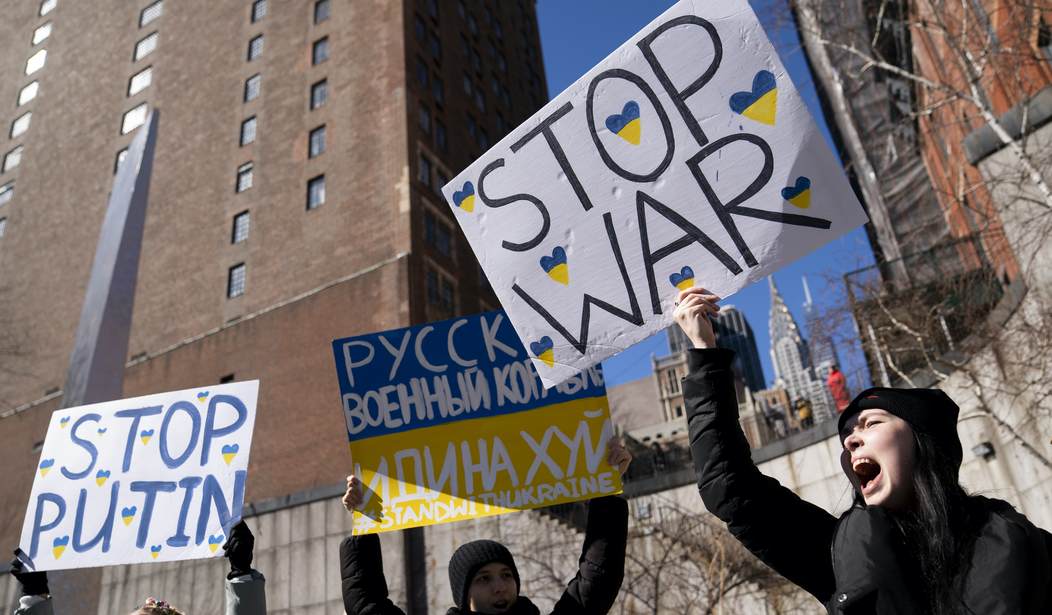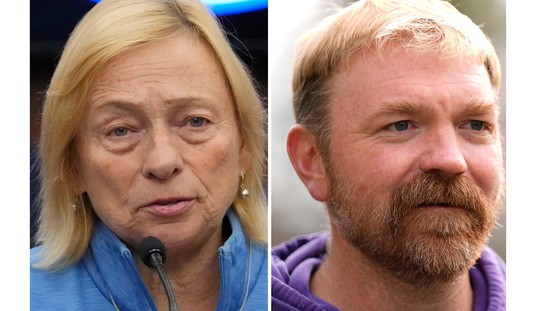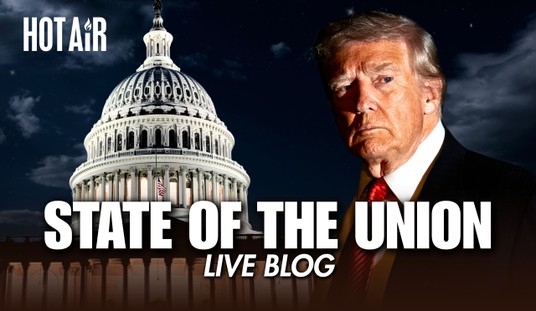Ugly phrasing here from a guy who helped craft America’s Russian “reset” in 2009, a policy that led to Obama famously sneering at Mitt Romney in 2012 that treating Russia as a foe was evidence of an antiquated 1980s worldview.
But I do think there’s an underlying truth to what Michael McFaul says below. There’s only one entity that may be capable of forcing Putin to retreat and that’s the Russian citizenry. The military could conceivably do it by deserting in Ukraine but the first deserters will be quickly shot as a lesson to any others who are considering it. Putin’s inner circle could do it by giving him a Caesar-esque exit from the world stage but Putin has likely surrounded himself with only fanatic loyalists at this point.
Mass demonstrations are the only quick and comparatively easy way out. But demonstrating against Putin comes at great personal risk, and I’m not prepared to deny anyone who lacks that courage the right to call themselves “innocent.”
There are no more “innocent” “neutral” Russians anymore. Everyone has to make a choice— support or oppose this war. The only way to end this war is if 100,000s, not thousands, protest against this senseless war. Putin can’t arrest you all!
— Michael McFaul (@McFaul) March 2, 2022
There are many innocent Russians. Some of them may even be carrying guns in Ukraine right now, conscripted into military service because Putin needed warm bodies, then undersupplied and underfed, then thrust into the fight without much training or logistical support. A few months ago the online right swooned over a Russian military recruiting ad that made Russian soldiers look like the second coming of Ivan Drago, honed to chiseled lethal masculine perfection. Here’s what they look like in reality:
Putin's Grande Armée, just conscripted kids with limited training. https://t.co/Ld7dBuJgyg
— Anders Östlund (@andersostlund) March 1, 2022
A Russian soldier surrendered. Ukrainians gave him tea, food, and let him call his mother on video. I want to cry from how much I love my country. pic.twitter.com/ZiERQsyBbo
— Anastasiia Lapatina (@lapatina_) March 2, 2022
Sentiments like “there are no innocent Russians” are destined to have unintended consequences, like encouraging threats towards Russians who very much are innocent. Non-Russians too: A D.C. restaurant called “Russia House” was vandalized a few nights ago because of its name. Neither of its two owners are Russian.
Obnoxious nonsense like this is destined to continue, at least for awhile:
Unless the filmmakers are affiliated with the Russian government, this is stupid and counterproductive tribalism. https://t.co/cAW64iiNkX
— StandWithUkraineHat (@Popehat) March 2, 2022
Jack Shafer records a few more examples:
In Londonderry, Vt., one bartender made his geopolitical statement by pouring a bottle of Stolichnaya vodka down the drain in a video — nice one, brainiac, Stoli is distilled by a Luxembourg company in Latvia. State authorities in Virginia, Oregon, Utah, Ohio, New Hampshire, Canada and elsewhere have barred genuine made-in-Russia hooch from distribution. Greece intends to suspend all collaborations with Russian cultural organizations, including a broadcast of the Bolshoi Ballet. Rep. Eric Swalwell (D-Calif.) wants all Russian students in the United States expelled and sent home. Pro-Putin artists and institutions are now banned from the Metropolitan Opera in New York. Peter Gelb, Met general manager, said, “We can no longer engage with artists or institutions that support Putin or are supported by him.” Disney is pulling new theatrical releases from Russia. Newly elected Virginia Gov. Glenn Youngkin has ordered a review of the state purchase of goods and services from Russian companies. And Roanoke, Va., Sarasota, Fla., Chicago, Ill., and other cities intend to file for familial divorce from their Russian sister cities.
That’s the global “cancellation campaign” against Russia at work in its crudest form. No one was going to boycott the film festival if the Russian films were shown; no one is under any illusions that excluding the films will affect the calculus of the Russian government in any way. The point of a cancellation campaign is to signal your solidarity with the group consensus about a moral outrage by making a show of contributing to the collective effort to ostracize. The only contribution to that effort the festival organizers could make was to punish some Russian filmmakers who’d done nothing wrong. Forced to choose between doing the right thing and participating in a mass shunning exercise aimed more at performing one’s virtue than bringing about meaningful change, they chose virtue-signaling.
And they did so at a moment when some brave Russians are protesting Putin’s war. I mean:
Kids detained for bringing flowers and signs to the Ukrainian embassy in Moscow with their moms.
Saw this one via @Anna_Veduta
I know I shouldn’t be shocked, but goddamn you, Putin and all who serve you. pic.twitter.com/5bYgVsMyeT
— Natalia Antonova 🇺🇸🇺🇦 (@NataliaAntonova) March 2, 2022
That’s as innocent as Russians, or any other people, get. But demonizing them is what happens when a cancellation campaign spills over from social media to meatspace and targets not just celebrity who made a tasteless joke but an entire population. Mob dynamics are loathsome enough when they’re limited to virtual reality.
I return to the point up top, though. If anyone’s going to end this war with minimal bloodshed and economic calamity, it’ll have to be the Russians themselves. The country’s most celebrated dissident, Alexei Navalny, pleaded for his comrades to rise up in protest in a Twitter thread this morning. A taste:
8/12 We cannot wait any longer. Wherever you are, in Russia, Belarus or on the other side of the planet, go to the main square of your city every weekday and at 2 pm on weekends and holidays.
— Alexey Navalny (@navalny) March 2, 2022
12/12 Everything has a price, and now, in the spring of 2022, we must pay this price. There's no one to do it for us. Let's not "be against the war." Let's fight against the war.
— Alexey Navalny (@navalny) March 2, 2022
That’s what McFaul meant, I think. Not that all Russians are complicit in Putin’s evil but that Russians alone have the collective power to stop him and should feel an urgent moral duty to do so. He just phrased it in the most jingoistic way possible.
The best argument I’ve seen for global cancellation of everyday Russians is this one at The Atlantic. If the basic problem at the moment is forcing Russia as a nation to internalize its externalities, shall we say, than bringing pain on the population is one way to do that:
It’s easy to see cultural boycotts as more of a symbolic act than a serious threat to Moscow’s geopolitical standing. But by suspending Russia from the world’s largest sporting and cultural arenas, these institutions are sending a clear—and, for Putin, potentially damaging—message: If Russia acts beyond the bounds of the rules-based international order in Ukraine, it will be treated as an outsider by the rest of the world…
So far, the cultural backlash fits neatly within the Kremlin’s overarching narrative that sanctions are proof of the West’s hatred not just of Putin and his oligarchs, but of the Russian people themselves. The longer the country’s cultural isolation persists, however, the more chance such measures have of breaking through the state’s narrative. If ordinary Russians can no longer enjoy many of the activities they love, including things as quotidian as watching their soccer teams play in international matches, seeing the latest films, and enjoying live concerts, their tolerance for their government’s isolationist policies will diminish. Several Russian sports stars, musicians, and other prominent figures have already voiced their opposition to Moscow’s invasion of Ukraine.
It’s certainly true that the west needs a way to break through the Russian government’s narrative at home. There’ll be no demonstrations so long as Russians are in this degree of denial:
You might say it's impossible that people are so brainwashed that they have no compassion at all. But surreal video chats show that the Kremlin's propaganda is stronger than any sense of humanity in Russia
— Iryna Matviyishyn (@IMatviyishyn) March 2, 2022
How much collective punishment do we want to pile on a population that doesn’t get to choose its own leader, though? The U.S. and EU have already inflicted some of the most brutal collective punishment in modern history by cutting off Russia’s central bank from the west, knowing what sort of hardship that’ll mean for average Russians but hoping that the measures will short-circuit Putin’s war machine. I don’t mean to sympathize with Russians too much — they’ve tolerated Putin for 20 years, after all — but between their leader surprising them with a war they thought wouldn’t happen, then deploying their ill-trained and under-equipped sons to go fight it, then bombing their relatives across the border, then exposing them to economic ruin in the form of western sanctions, kicking them out of film festivals too feels a bit … gratuitous.
And muddled in its messaging. Not so much “Putin is shameful” as “being Russian is shameful.” Which isn’t a great message, especially if the cancellation campaign is supposed to be winning Russian hearts and minds.









Join the conversation as a VIP Member